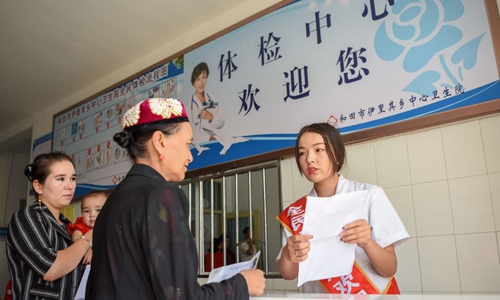HOME >> OPINION
Health equity proves human rights progress in Xinjiang
By Yu Ning Source:Global Times Published: 2019/11/19 22:03:40

Residents receive free health checkup at a health center in Hotan, Northwest China's Xinjiang Uyghur Autonomous Region, August 23, 2019. Photo: Xinhua
"The enjoyment of the highest attainable standard of health is one of the fundamental rights of every human being without distinction of race, religion, political belief, economic or social condition." These words were adopted in the Constitution of the World Health Organization in 1946, establishing the right to health as a fundamental human right.
As China has once again become the target of criticism over the alleged human rights abuses in its Xinjiang Uyghur Autonomous Region, let's examine how the region's medical services have developed and the status of the people's health conditions there.
Xinjiang's medical services used to be in a poor state that saw a shortage of doctors and medicine. The region suffered epidemics of the plague, smallpox and cholera. It has witnessed a significant improvement over the years.
Official statistics show there were 15,721 medical institutions of various kinds by the end of 2016 and the average life expectancy there has risen to over 72 years.
A multi-layered basic social security system with wide coverage has been in place and special attention is given to the poor. Just last month, the Xinjiang regional government announced that it has appropriated about 2.5 billion yuan ($350 million) this year for medical assistance for its poor population.
This is big progress. As the country makes strides to improve health and development, Xinjiang is no exception. China's achievements have been acclaimed by many international heavyweights, including Bill Gates. The billionaire philanthropist said in a recent interview with the Xinhua News Agency that China's remarkable progress in improving health equity and reducing poverty could offer lessons for other developing countries to accelerate their development.
China has been endeavoring to improve human rights, notably in ensuring fundamental rights and development rights over the past 70 years. Xinjiang's progress in health and medical services is the epitome of China's improvement in the sector over the past decades. The country is doing what it can to promote healthcare reform and improve health equity.
Philip Alston, the UN's special rapporteur on extreme poverty and human rights, observed in a report in 2017 that the "health gap" between the US and its peer countries continued to grow and that Americans could expect to live shorter and sicker lives. How can Washington sit on the moral high ground and criticize China's Xinjiang governance and human rights development?
West and China have different judgment criteria when it comes to human rights. But there should be no dispute that Xinjiang, a region facing terrorism and extremism threats, should prioritize the protection of fundamental human rights, including the right to live, health and development. What China is doing in its Xinjiang region is ensuring stability so that the people's fundamental rights can be realized.
Thanks to the country's and region's efforts, Xinjiang is embracing its best time in history with improved livelihood, social stability, security and economic development.
The best way to improve human rights there is to continue the current governance, and not be influenced by Western criticisms that are full of arrogance, prejudice and lies.
Posted in: OBSERVER